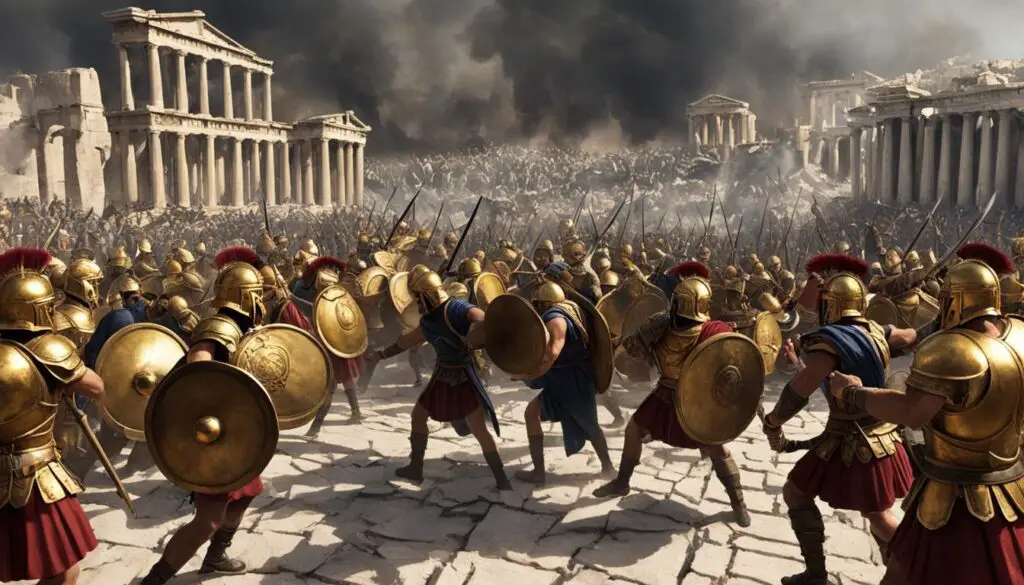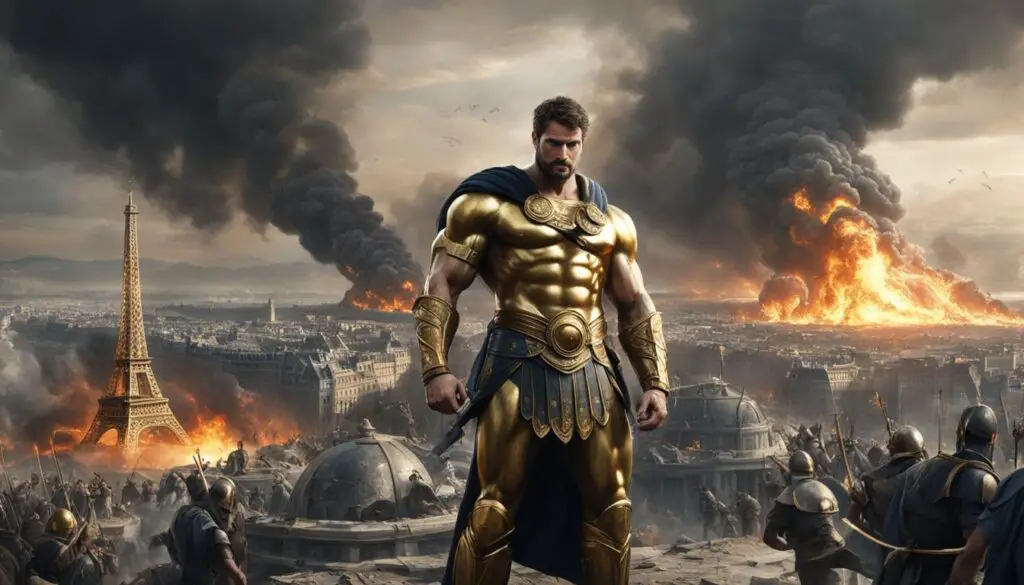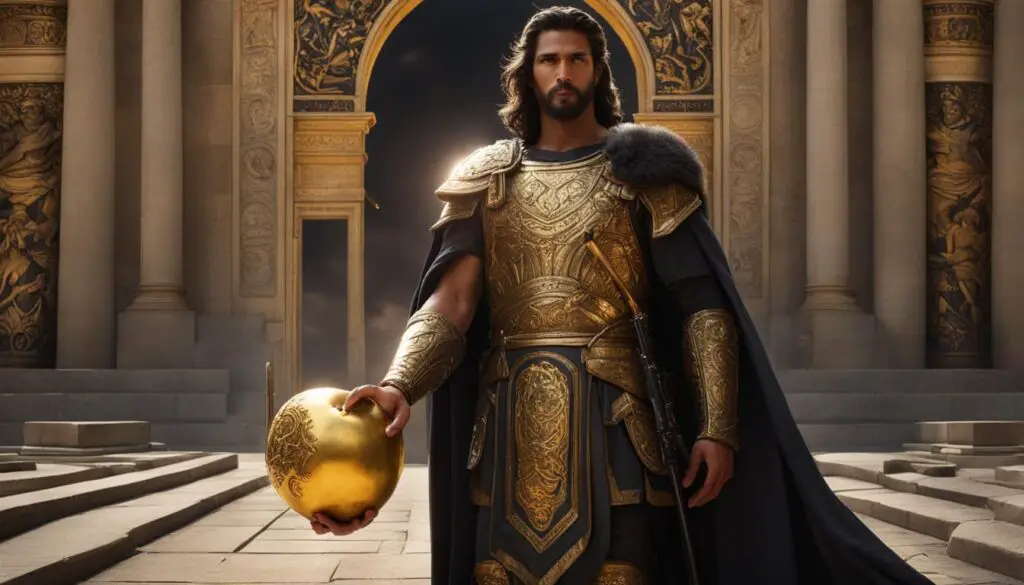Paris, a key figure in Greek mythology, played a crucial role as the catalyst of the Trojan War. Son of King Priam and Queen Hecuba of Troy, Paris’s choices and actions ignited the legendary conflict between the Greeks and the Trojans. His story is closely intertwined with the events that unfolded during the war, involving his abduction of Helen of Sparta and the infamous judgment of Paris.
Key Takeaways:
- Paris, son of King Priam and Queen Hecuba, was a significant figure in Greek mythology.
- His choices, including the abduction of Helen of Sparta, led to the Trojan War.
- The judgment of Paris, where he chose Aphrodite, set the stage for the conflict.
- Despite his impact, Paris is often overshadowed by other heroic figures in ancient literature.
- Studying Paris’s story offers insights into the power of love, betrayal, and individual decisions.
Early Life of Paris
Paris, the son of King Priam and Queen Hecuba of Troy, had an intriguing beginning to his life. According to a prophecy, he was destined to be the downfall of Troy. As an infant, Paris was abandoned and left to die on a mountainside, a cruel fate for any child. However, fate had other plans for him.
Paris’s remarkable survival story took an unexpected turn when a compassionate bear discovered him and decided to nurse him. The bear’s care and protection kept Paris alive during his early days, a truly extraordinary feat.
But Paris’s journey didn’t end there. He was later found by a herdsman named Agelaus, who was astonished by his resilience and survival against all odds. Impressed by the young boy’s story, Agelaus made the compassionate decision to raise Paris as his own, unaware of his true royal lineage.
Under Agelaus’s guidance, Paris grew up to be a beautiful and intelligent young man. He lived a simple life, unaware of the destiny that awaited him and the role he would play in the legendary Trojan War.
The Judgment of Paris

One of the significant moments in Paris’s life was the judgment of Paris, an event that would have far-reaching consequences. The top god Zeus hosted a banquet on Mount Olympus, inviting all the gods and goddesses. During the feast, Paris was chosen by Zeus to decide which of the three goddesses, Athena, Aphrodite, and Hera, was the most beautiful.
Each goddess offered Paris a bribe, but he ultimately chose Aphrodite’s promise of the love of Helen of Sparta, renowned as the most beautiful woman on earth. This choice would set in motion the chain of events that led to the Trojan War.
Paris and the Golden Apple
At the judgment of Paris, Zeus presented the goddesses with a golden apple, inscribed with the words “To the Fairest.” This golden apple became the catalyst for a fierce competition among the goddesses, each vying for Paris’s favor by offering him bribes.
- Athena, the goddess of wisdom and battle strategy, promised Paris victory in his future battles.
- Hera, the queen of the gods and goddess of marriage, offered Paris political power and sovereignty.
- Aphrodite, the goddess of love and beauty, enticed Paris with the love of Helen, the most beautiful woman in the world.
In the end, Paris’s choice of Aphrodite and the golden apple set into motion a series of events that would lead to the devastating Trojan War, a conflict that would shape the course of Greek mythology.
Paris’s fateful decision not only determined the most beautiful goddess but also sparked jealousy, betrayal, and revenge among the gods and mortals. The judgment of Paris serves as a cautionary tale about the consequences of making choices based on personal desires and the far-reaching impact of those decisions.
The Trojan War

The Trojan War, one of the most famous conflicts in Greek mythology, was ignited by Paris’s elopement with Helen, the wife of Menelaus, the King of Sparta. This act of betrayal led to a Greek campaign against the city of Troy, seeking to retrieve Helen and avenge the dishonor. While Paris’s combat skills were inferior to those of renowned Greek warriors like Hector and Achilles, he still played a significant role in the war.
Amidst the chaos of battle, Paris had a moment that would forever impact the outcome of the war. With the assistance of Apollo, the Greek god of archery, Paris shot a fatal arrow into Achilles’ heel, the hero’s only vulnerable spot. This act of cunning and prowess brought down one of the greatest warriors on the Greek side.
However, Paris himself did not escape unscathed. He met his demise during the war, mortally wounded by an arrow shot by his rival archer, Philoctetes. Despite his shortcomings as a warrior, Paris’s actions still shaped the course of the Trojan War and had far-reaching consequences for both sides involved.
The Role of Achilles
Achilles, the Greek hero known for his invincibility, played a crucial role in the Trojan War. His absence from the battlefield due to a quarrel with Agamemnon initially gave the Trojans an advantage. However, Achilles’ return to the fight brought devastating losses to the Trojan army, culminating in his encounter with Paris.
The Greek Campaign against Troy
The Greek campaign against Troy was marked by numerous battles and heroic feats. The legendary Greek warriors, united under the leadership of Agamemnon, embarked on a mission to conquer Troy and retrieve Helen. These warriors, including Ajax, Odysseus, and Diomedes, showcased their strength and strategic prowess as they waged war against the Trojans.
Helen of Sparta
Helen of Sparta, whose beauty was said to be unrivaled, was the woman at the center of the Trojan War. Her abduction by Paris and subsequent elopement to Troy with him set off the chain of events that led to the war. Helen’s beauty became both a curse and a catalyst for the conflict between the Greeks and the Trojans.
The Legacy of the Trojan War
The Trojan War left a lasting legacy in Greek mythology and history. It has inspired countless works of literature, art, and drama, becoming a symbol of heroism, tragedy, and the complexities of human nature. The war’s impact extends beyond the ancient world, with its themes and lessons continuing to resonate in modern culture.
The Legacy of Paris

Despite Paris’s significant impact on the Trojan War and his notable accomplishments, he has not received the same historical favor as other heroes. However, his story remains crucial in understanding the events of the war and the consequences of his choices.
Paris’s judgment, where he chose Aphrodite’s promise of the love of Helen of Sparta, set in motion a series of events that shaped Trojan War narratives. The abduction of Helen by Paris became the catalyst for the Greek campaign against Troy, igniting the legendary conflict.
Furthermore, Paris played a vital role in the downfall of Achilles, the greatest Greek warrior. With the assistance of the god Apollo, Paris delivered the fatal shot that struck Achilles in his only vulnerable spot, his heel.
Despite his divisive actions and their calamitous consequences, Paris’s impact on the Trojan War cannot be understated. His story provides valuable insights into Greek mythology and the intricacies of human emotions.
Paris’s Historical Favor
Despite his historical neglect, Paris’s relevance and significance in Greek mythology must not be overlooked. The tale of Paris serves as a cautionary example of the power of love, betrayal, and the far-reaching consequences of individual decisions.
While other heroes may overshadow Paris, his role as the catalyst of the Trojan War and his contributions to the mythological narrative make his story essential in understanding the ancient Greek world.
Conclusion
Paris, the Trojan prince who ignited the Trojan War, holds a significant place in Greek mythology. His choices and actions set in motion a chain of events that led to the legendary conflict between the Greeks and the Trojans. While overshadowed by other heroic figures, Paris’s story highlights the power of love, betrayal, and the consequences of individual decisions. His role in the Trojan War continues to be a subject of fascination and study, serving as a cautionary tale of how one person’s choices can alter the course of history.
Paris’s significance lies not only in his involvement in the war but also in the timeless themes his story represents. The judgment of Paris, where he selected Aphrodite as the most beautiful goddess, demonstrates the influence of desire and beauty. His abduction of Helen, the most beautiful woman in the world, shows the lengths people would go for love. And his fateful shot that led to the death of Achilles speaks to the unpredictability of fate and the role of destiny in shaping events.
Although Paris’s legacy may have been overshadowed by more celebrated heroes, his story remains essential in understanding the complexities of the Trojan War and the multifaceted nature of human motivations. From his early life as an abandoned child to his role as the catalyst of one of the most significant conflicts in ancient history, Paris’s journey encompasses themes of bravery, passion, and the consequences of one’s choices. The lessons we can learn from Paris’s story continue to resonate, reminding us of the profound impact individuals can have on the course of history.
FAQ
Who is Paris in Greek mythology?
Paris is a Trojan prince and the son of King Priam and Queen Hecuba of Troy. He played a crucial role as the catalyst of the Trojan War.
What is the judgment of Paris?
The judgment of Paris refers to a mythological event where Paris was chosen by Zeus to decide which goddess, Athena, Aphrodite, or Hera, was the most beautiful. Paris ultimately chose Aphrodite, who promised him the love of Helen of Sparta.
How did Paris contribute to the Trojan War?
Paris ignited the Trojan War by eloping with Helen, the wife of Menelaus, the King of Sparta. The Greeks, led by Menelaus’s brother Agamemnon, launched a campaign to retrieve Helen and avenge the dishonor. Paris also played a significant role in the war, including fatally shooting the Greek hero Achilles with the help of the god Apollo.
Did Paris survive the Trojan War?
No, Paris was mortally wounded by an arrow shot by his rival archer, Philoctetes, during the Trojan War.
What is the legacy of Paris in Greek mythology?
Paris’s choices and actions had far-reaching consequences and shaped the events of the Trojan War. His story serves as a cautionary tale of the power of love, betrayal, and the consequences of individual decisions.




